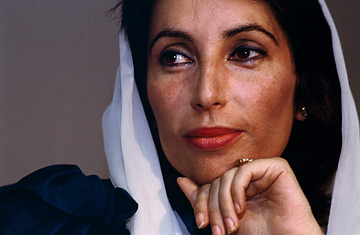
The late Pakistan opposition leader Benazir Bhutto
Benazir Bhutto was a divisive figure. Adored by the millions who saw her as the inheritor of her father's political legacy and heir to his Pakistan People's Party, she will always be remembered as "Pinky." It was an affectionate nickname used by those who had the opportunity to know her in earlier days, before the title Prime Minister preceded her name, or now, "assassinated former Prime Minister." But many others see her as an opportunist, a young idealist who studied at the knee of her father only to grow into a potent political force on her own, her good intentions often stymied by ambition. Bhutto's posthumously printed memoir, Reconciliation: Islam, Democracy and the West, will do little to change those ingrained opinions. That's a pity because it is a book that should stand on its own.
At times choppy, disjointed and repetitive, Reconciliation reads more like a manuscript than a finished piece, testament perhaps to an editing process curtailed by the death of its author on the 27th of December. As such it is a fitting monument to an incomplete life. Jagged and harrowing references to the October 19th bombing of her welcome home rally in Karachi, in which some 150 died, are inserted almost randomly into otherwise fluid prose that was written long before. The ubiquitous references to terrorism, however, underscore an important point. As a Muslim, and a victim, Bhutto is uniquely poised to present to her audience an impassioned plea for understanding. The war we should all be worrying about is not between Islam and the West, she says, but between moderates and extremists.
Bhutto treats the terrorist attacks of September 11, 2001, as a personal affront, one that "twisted the values of a great and noble religion and potentially set the hopes and dreams of a better life for Muslims back a generation." Muslims, she says, "became [al Qaeda's] victims too." For the first half of the book, Bhutto attempts to reclaim Islam from the perversion of fundamentalists that would use it for political advantage, explaining how the concept of jihad, meaning a personal struggle "to follow the right path," had been adulterated for the purposes of fighting the Soviet invasion of Afghanistan. She puts the treatment of women as described in the Koran into context, demonstrating how at the time it was revolutionary and far more progressive than what was practiced by contemporary Christian and Jewish societies. The problem, she laments, is that Islam's progressive traditions calcified in the 17th century, when religion was reduced to a tool to consolidate power.
Her call for a resurrection of ijtihad — the early tradition of challenge and inquiry that demanded a re-interpretation of the Koran relevant to the current era — is bold. Were she alive at the time of publication, she most certainly would have been charged with blasphemy by fundamentalist circles. Bhutto offers no new revelations — any close scholar of modern Islam will have made the same observations. But her reiteration of the Koran's message of peace and tolerance bears repeating; it is one that is often drowned out by the more headline-grabbing missives of those calling for death to America.
While short, the chapter refuting Samuel Huntington's theory of the Clash of Civilizations is particularly pertinent. Huntington posited in a 1993 essay in Foreign Affairs that conflict between Islam and the West was inevitable. Bhutto, drawing on the works of several authors in a New York Review of Books-type essay fears Huntington's work "has actually helped provoke the confrontation it predicts... The clash of civilizations theory is not just intellectually provocative: it fuels xenophobia and paranoia both in the West and in the Islamic world." Instead, she says, the tension is within Islam itself. "The failure to resolve that tension peacefully and rationally threatens to degenerate into a collision course of values spilling into a clash between Islam and the West."
Yet Bhutto's solutions seem naive and simplistic. She suggests an end to dictatorship, greater economic investment, better education and a "reconciliation corps" of cultural ambassadors modeled after the American Peace corps program. While no one will deny the importance of such moves, they fail to tackle the fundamental schisms within Islam. Successful ambassadors of moderate Islam can be found around the world, yet few seem able to stand up to extremism with any kind of impact.
The book's flaws are a reflection of the Bhutto baggage. Her revisionist history — an echo of her earlier memoir, Daughter of the East — airbrushes out unpleasantries that call for a deeper examination. Significant charges of corruption are dismissed as politically motivated, and her government's early support of the Taliban regime in neighboring Afghanistan is forgotten. Her insistence that 3 million supporters thronged the streets of Karachi to greet her return from exile strains credibility, especially as most journalists and observers put the number at a generous 300,000. Most egregious however, is her overwrought descriptions of the terrible blast that same night. The death toll is enough; her account of watching a video of the event later and hearing the faint cry of Jeay Bhutto — "long live Bhutto" — from the wounded as they lay dying in the streets smacks of political aggrandizement.
Those passages, fortunately, are over quickly and what remains is an honest effort at exploring an issue that will continue to plague the world for years to come. The tragedy of Bhutto's death is not so much in the loss of a great leader for Pakistan — her record in government is hardly to be emulated — but in that she has been silenced. Her messages need to be said over and over again. The tragedy is that the leader unafraid to speak those messages is gone just when she had finally begun to articulate them.
